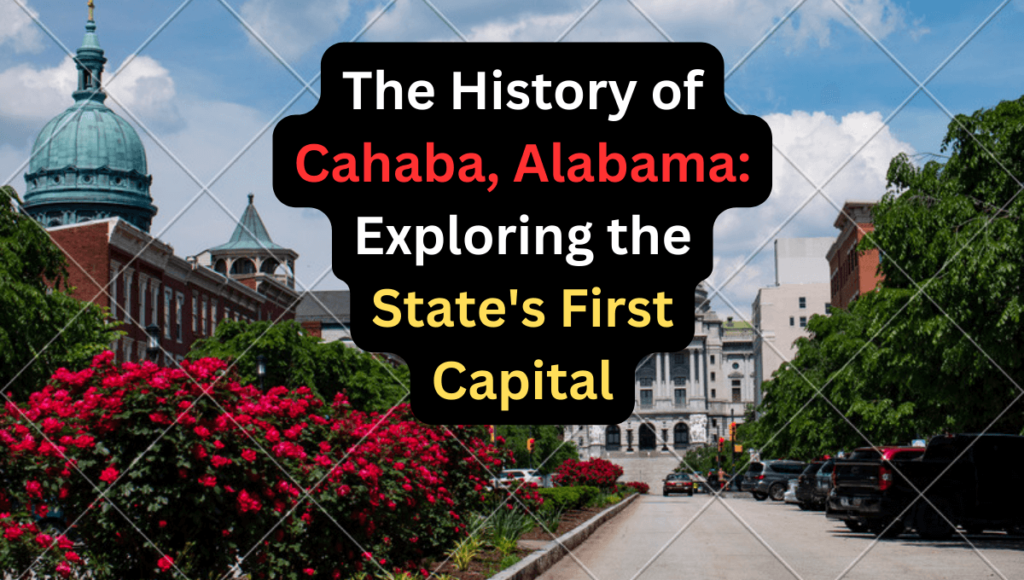Cahaba, Alabama was always on my dream destination list because of its rich history and cultural heritage. Located in Dallas County, it is a small town with a big story to tell.
Cahaba was founded in 1819 as the first permanent state capital of Alabama. It was chosen due to its central location and access to navigable waterways. The name “Cahaba” comes from a Choctaw word meaning “water above,” which refers to the Cahaba River that flows through the town.
The early years of Cahaba were marked by growth and prosperity. It quickly became a hub for government, commerce, and social life in the state.
When I delved deeper into the history of Cahaba, I uncovered stories of its inevitable decline and the echoes of its former glory that intrigue history buffs to this day. By exploring the full article, you’ll journey through Cahaba’s unique timeline, including its role in the American Civil War, its transformation after being abandoned as the state capital, and the eventual ghost town it has become.
I invite you to read on and discover the hauntingly beautiful tales that Cahaba holds within its silent ruins and age-old legends stories that deserve to be remembered and told.
Introduction
Nestled at the point where the Alabama and Cahaba rivers merge, there exists a serene yet significant location that harks back to a time when it was a thriving political center. The town of Cahaba, which is often ignored, was the first capital of Alabama and it has a rich historical legacy.
This tale aims to uncover the intriguing past of Cahaba, exploring the remains and remnants of a city that was once bursting with vitality and political zeal. From the eroded, moss-covered ruins of old buildings to the rusted remnants of the once-busy port, every fragment of Cahaba tells a story of a bygone era.
Through this compelling story, we seek to bring Cahaba’s remarkable history to light, revealing the long-forgotten tales of the people who once lived there and the political events that took place within its borders.
Historical Significance
Cahaba was more than just a seat of governance; it was a dynamic player in the early days of Alabama’s statehood. It was here that critical decisions shaping the young state took root, and where societal norms of the era played out against a backdrop of burgeoning American democracy.
The Role in State’s Political and Social Development
During its brief tenure as the capital, Cahaba saw the drafting of influential laws and the shaping of a fledgling society. Its strategic river location also made it an integral trade and transportation hub, fostering a vibrant community reflective of the economic ambitions of the young United States.
Key Landmarks and Structures
Despite the passage of time, Cahaba is far from forgotten. It boasts several key landmarks that continue to tell its storied history.
Description of Notable Buildings and Sites
- The Cahaba State Capital Building: Though its physical structure has not survived, the site remains, punctuated by commemorative markers that narrate its historic import.
- Old Cahawba Archaeological Park: Visitors can explore the park, imagining the town in its antebellum prime with streetscapes and foundations, which are still visible.
- St. Luke’s Episcopal Church: Relocated from its original site but rescued from oblivion, the church offers a glimpse into the spiritual lives of Cahaba’s early residents.
Each remnant and relic whispers hints of a bygone era, inviting visitors to imagine the stories that unfolded here.
Abandonment and Preservation
Like many early American towns, Cahaba was not immune to the transformation of time and fortune. Floods, the relocation of the state capital to Montgomery, and the Civil War left it a shadow of its former self, leading to a gradual but irreversible decline.
The Survival of Cahaba
However, the tale of Cahaba is also one of resilience. Efforts to preserve what remains have been underway for years, ensuring that the story of Alabama’s first capital continues to be told to future generations.
Visiting Cahaba Today
If you have a passion for history or urban exploration, Cahaba Alabama’s first state capital is the perfect place for you. This abandoned city offers a poetic journey through time that is sure to captivate your imagination.
Exploring Tips for Visitors
- Plan Your Visit: Check the weather and park hours before departing to make the most of your exploration.
- Guided Tours: Consider taking a guided tour to gain deeper insight into the rich history of Cahaba.
- Bring Necessities: Wear comfortable walking shoes and bring water, sunscreen, and insect repellent to enhance your experience.
- Photography: Cameras are encouraged to capture the haunting beauty of the ruins, but remember to respect the site by not disturbing the structures.
- Stay on Paths: To protect the delicate ruins and your own safety, adhere to marked paths and signage.
- Educational Resources: Use the provided educational materials and signage to enrich your understanding of each site.
- Wildlife Caution: Be aware of the local wildlife; observe animals from a safe distance.
- No Metal Detectors: To preserve the integrity of historical artifacts, metal detectors, and digging are not permitted.
- Leave No Trace: Maintain the pristine condition of the park by taking all trash with you.
- Local Support: Consider shopping or dining in the local community to support the economy and learn more from the residents.
Conclusion
Slowly when we step through the silent avenues of Cahaba Alabama’s first state capital, we are reminded of the importance of preservation and the power of place in telling the story of who we are. While its days as the political heart of Alabama were short-lived, the memory of Cahaba remains an essential thread in the state’s rich historical tapestry.
Cahaba, with its majestic desolation, continues to be a symbol of Alabama’s complex and storied past a place where history’s heartbeat can still be felt beneath the surface of the serene Alabama countryside.
You should Visit and explore the lingering legacy of what was once a pulsing center of progress Cahaba, Alabama’s first state capital.

